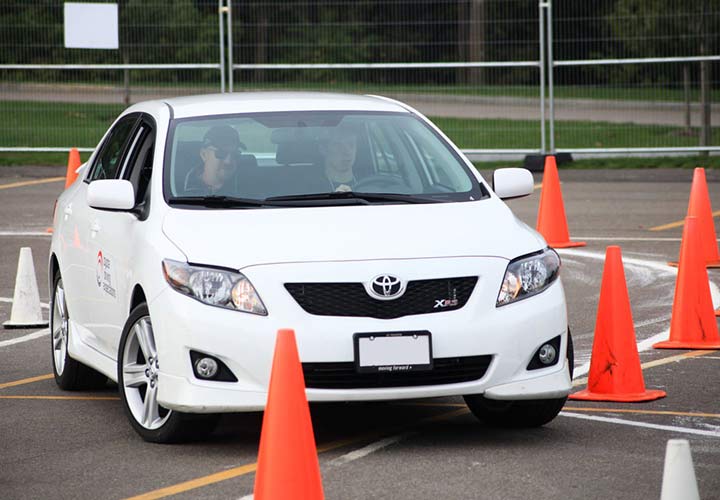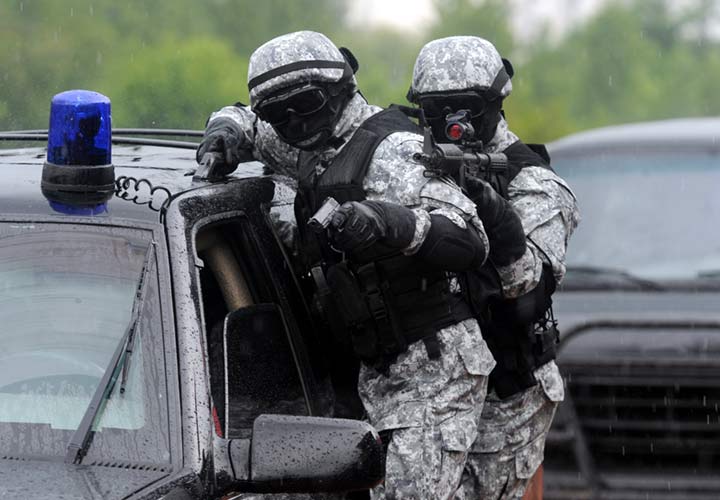
GUARD TRAINING
Contract Security Guard Training
Fixed site and mobile uniformed security guard force personnel are trained to perform at a standard that complies with the Federal Protective Service (FPS) SMART Book (formerly the Security Guard Information Manual or SGIM) as provided by the FPS and the DHS National Protection and Programs Directorate.
Government Mandated Guard Training
Many government agencies require a training standard that is unique to the needs of their particular agency or department such as DOE or NASA. In those instances, The Whitestone Group adopts the mandated training manuals and rigorously follows the required guidelines.
DHS-Designated Critical Infrastructure Security Guard Training
Security personnel who are assigned to a DHS-designated Critical Infrastructure Site (chemical, nuclear, petroleum and natural gas facilities — including plants, refineries, storage and distribution centers) obtain supplemental training in the Responsible Care® Security Code, a standard set by The American Chemistry Council in anticipation of the forthcoming regulations for critical infrastructure security standards set forth in H.R. 5441: Department of Homeland Security Appropriations Act, 2007. In addition, security guards posted at critical infrastructure sites are introduced to the strategies and tactics that terrorists have been known to use at similar sites worldwide.
Rapid Response Specialized Team
All personnel who become members of the Rapid Response Team undergo specialized training that tests their technical and tactical skills before they are sent on crisis-generated missions. Selected personnel are put through simulation drills to demonstrate a satisfactory response to bomb threats, hostage situations, terrorist threats, and natural disasters such as floods, fires and earthquakes.
This training also includes:
- Site management
- Protective operations legal updates
- Human and community relations
- Inter-agency liaison
- Counter-terrorism tactics

PERSONAL PROTECTIVE SERVICES TRAINING
Personal Protective Service Course
The Whitestone Group’s Personal Protective Service Course is designed to introduce Special Agents to proactive time-tested strategies that are designed to detect, avoid, and counter potential threat situations while allowing the client to accomplish his or her goals in a timely, efficient, and seamless manner. The course also standardizes use of force policies and tests the agent’s reactive skills through traditional “assault on principle” simulation drills.
All Whitestone Group Special Agents who have been assigned to a personal protective services contract will have completed the Whitestone Group’s Personal Protection Course, or its equivalent, in a qualified training facility. These courses include classroom and fieldwork in the following fields of study:
Course Module #1: Personal Protective Detail Basics
- Principles of Protection (The Proactive Model)
- Advance Work (Electronic and Human)
- Command Post Operations, Communications, and Operational Protocols
- Principles of Surveillance in PPSG Operations
- Human Intelligence Collection and Analysis
- Corporate Cultures, Celebrity Cultures, and Dignitary Protocols
- Bomb Search and Identification, Physical TSCM Sweeps
- Motorcade and Foot Movements that include One-on-One Protection Tactics, Two-on-One Protection Tactics, and Team Formations
Course Module #2: Profiles in Violence
- Observation and Behavioral Cues
- The Strategy and Tactics of Criminal Gangs and Kidnap Organizations
- The Strategy and Tactics of Militant Extremist Organizations
- Stalking, Paparazzi and Other Dangerous Human Behavior
Course Module #3: Personal Protection Defensives
- Empty Hands: suppression and attrition techniques that span the force continuum from the efficient low profile handling of low level resistance to high threat armed opponents.
- Improvised Weapons: the location and deployment of intermediate and lethal force supported by objects available in the environment.
- Intermediate Weapons: (baton, OC sprays, stun gun)
- Small Arms Deployment: (short-range accurate tactical deployment; individual and team scenario training)
Course Module #4: Assault on Principle Scenarios
- Combining skills from modules 1-3, Special Agents are tested in their ability to evade and react to mock assailants while servicing a client in a timely, efficient and secure manner.

SECURITY DRIVER TRAINING
Security Driver Courses
Over the last 30 years, through the influence of professionals like Tony Scotti (Tony Scotti Training Network) and Bill Scott (Bill Scott Raceways), we have established, and quantified, the physical laws that govern both driving and reacting to driving emergencies. Standards have been set that measure the training and testing of students by using both physics and calculus in the track design, driving speed guidelines, and driver response times. By following this method, drivers, security companies, and their clients can be assured that students are properly vetted for safe and efficient performance under emergency conditions.
Security Patrol Driving Course
A basic Security Patrol driving course is mandatory for all security guard personnel who are scheduled to provide roving vehicle security patrols. This course includes:
- The Science of Driving and Vehicle Dynamics
- Vehicle Patrol Techniques
- Fleet Security and Management
Tactical Driver Courses
The Tactical Driver Course is mandatory for all personal protection Special Agents who are detailed as security drivers for dignitary, corporate executive and celebrity protection details. This course includes the following curriculum:
- The Science of Driving and Vehicle Dynamics
- Protective Tactical Driving (single and multiple vehicle maneuvers)
- Route Planning
- Motorcade and Convoy Operations (two or more vehicles)
- Fleet Security and Management.
Offensive driving courses are offered to protective service Special Agents and PSD-High Risk security drivers, motorcade drivers, and convoy drivers. This objective of this course is to teach drivers how to use the vehicle as a weapon. Tactics include vehicle ramming, pitting, ¼, bootleg, the slingshot, and small arms fire from a moving vehicle.

PSD HIGH RISK TRAINING
PSD High Risk Courses
The State Department has standardized security contractor services for international high-risk theaters of operation under the World Wide Personal Protective Services (WPPS) program. This program establishes the highest standard for contracting and posting private security firms in Bosnia, Iraq, and Afghanistan. The WPPS program divides security duties into two major functions: (1) static guard services that protect their facilities (Force Protection) and (2) personal security details (PSD) and security escorts (Convoys Protection). The standard for operatives working under this program includes a proven history of military or police service, a 127-hour course of training approved by the Bureau of Diplomatic Security, and the ability to obtain a Top Secret Security Clearance.
All Whitestone Group operatives, who have been assigned to a DSS personal protective services contract or a private sector security contract, will have completed an authorized DSS security operative course from a qualified learning institution as well as contract-specific training. All Whitestone Group PSD-High Risk Supervisors (Program Managers, Guard Force Commanders, Shift and Site Supervisors) are also subject to DSS hiring standards.
PSD High Risk Tier One Course (Contract-Specific)
This course is provided as a core curriculum for contract-specific training and is only open to those operatives who qualify as seasoned Tier One operatives or selected Tier Two operatives who offer specialized skills (language, technical, EOD, paramedic) that can enhance the contracted mission. These missions include
but are not limited to PSD convoy protection, Listening Post/Observation Post operations, or military intelligence support.
PSD High Risk Tier Two Course (Contract-Specific)
This course is provided as a core curriculum for contract-specific training and is only open to those operatives who qualify as seasoned Tier One and Tier Two operatives or selected personnel from the military, federal, state or local law enforcement that offer specialized skills (language, technical, EOD, K-9, paramedic) that can enhance the contracted mission.